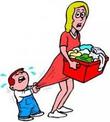 In the Bible, Proverbs 22:6 tells us to “raise our children in the ways of the Lord so that, when they grow old, they will not depart from Him.” As parents, that’s quite a tall order. Research shows that 80% of churched 16 year olds leave the church. These are kids who grew up attending their church at least twice per month, including Sunday School, youth groups, vacation Bible camps. What? 80% of these hardcore churched teens leave the church at 16? What have we done wrong? Well, the rest of the story is that 80% of these departures actually return to church by the time they are 25 or by the second birthday of their first-born child. Why is that? When our normal, healthy teens go through adolescence, they question everything, even going to church. Once they find themselves and achieve identity integration, they get back to their strong, deep roots in the church. If we are lucky, they will tell us “thanks,” but don’t count on it. So, the lesson is to hang in there when your teen goes through their personal wilderness experience. As our kids develop, we spend a lot of time doing with and doing for them. How do you know when to do which? Five year old Billy throws his sneaker at his mom and yells at her, “Mooom, haven’t you heard of Velcro?” He has been unsuccessful in tying his lace sneaks. Dutifully, mom puts down her laundry basket, walks to Billy, kneels down beside him and cradles him. “It’s frustrating trying to learn new things, huh?” Billy pushes out of her cuddle, retrieves his sneaker, and demands, “Do this for me!” Mom puts the sneaker on his foot, pauses, and concludes, “You know what? I think you can figure this one out. Why don’t you give it a try.” What a great example of active listening. Mom could have punished Billy for his outburst and disrespect, but that wouldn’t have gotten his shoe tied. She used her active listening to lower his emotional fever and then re-directed him to task. However, this well-intentioned parenting likely would end with more frustration by Billy and a greater outburst. Developmentally, at age 5, Billy doesn’t have the mental capacity to “figure this one out.” At Billy’s age, mom is wise to use what I call “hands-on parenting.” First, she does for Billy, and then, as he calms down and shows interest, she takes time to patiently teach Billy a new skill, in this case, tying his own shoes. From ages 6 to 12, parents use “directive parenting,” where your youngster has the freedom to explore his world, but with your supervision and oversight. Here, we are also doing for our children, as they are learning the ropes of safety, sharing, and responsibility From ages 13 to 18, parents begin to use “advice-based parenting,” which further expands their exploration, but with your sharing the wisdom of your experience. Here, we move more away from doing for and toward doing with. After age 19, as your teen is launched into adulthood, we shift to “consultative parenting.” Your lead comment is, “I have some thoughts about what you are going through, son. Do you want to hear them?” Through all of these parenting stages, active listening helps your child get where they need to go. Through active listening, we empower, enhance, enable, and engage our children to succeed in life.
0 Comments
Leave a Reply. |
Archives
January 2024
Categories
All
|

 RSS Feed
RSS Feed
